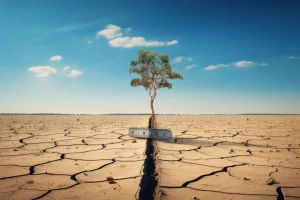South African smallscale fishermen are standing up against TotalEnergies’ offshore oil and gas exploration plans amid fears that they will ruin their livelihoods. Led by fisherman Sifiso Ntsunguzi, the community is concerned about the environmental impact of the proposed sites and the potential loss of fish, which is their main source of food and income. Environmental group Green Connection has sued the government over TotalEnergies’ environmental authorisation, and the company’s promises to reach netzero carbon emissions by 2050 are being scrutinised. The conflict highlights the challenges of balancing economic development with environmental preservation.
South Africa’s unpredictable climate silently adds to the struggle of the homeless population, making their already challenging lives even more uncertain. During winters, severe chill increases the danger of frostbite and other coldrelated health issues. However, the magnitude of this humanitarian crisis remains unknown, and statesanctioned shelters offer temporary relief. Regular citizens can also contribute by donating money, food, clothes, and blankets to these shelters; it’s a shared responsibility to help those without homes weather the storm.
Cape Town’s Bloubergstrand, a beloved tourist destination, is facing a grave threat due to rising sea levels from climate change. Studies project a loss of 112.1 meters of coastline by the end of the century, making it the ninth most atrisk tourist beach in Africa. This highlights the urgent need for immediate and collective action from global political and economic entities to address the worldwide crisis of rising sea levels and erosion. Saving these natural marvels is not just an environmental priority, but an economic necessity.
The South African wine industry is adapting to climate change by replanting vineyards to conform to natural contour lines, installing drains to direct rainfall towards a reservoir, fostering biodiversity to enhance soil fertility, and preparing for future climate challenges. The vineyards in Stellenbosch are being extensively restructured to better endure heavy rain episodes, and the goal is to create a harmonious relationship with nature. The industry must prepare for a global temperature escalation of up to 3 degrees Celsius and a 30% shrinkage in annual rainfall by midcentury.
South Africa has made significant progress in fulfilling basic needs and developing infrastructure through its Reconstruction and Development Programme (RDP). The government’s focus on intergovernmental planning, budgeting, and implementation has led to improvements in access to essential services. However, challenges remain, and the administration is working towards a better future for all, including partnerships with the private sector and addressing climate change impacts. The journey is far from finished, but the government is committed to ensuring that no one is left behind in this journey.
Climate tech company Spiritus has pledged to offset the carbon emissions from Taylor Swift’s private flight from Japan to Las Vegas using its Direct Air Capture technology. The company’s innovative technology simulates the human lung to remove carbon from the air, potentially lowering the cost of carbon removal to under $100 per ton. Spiritus CEO Charles Cadieu emphasised the importance of carbon removal to combat environmental damage and make a sustainable future a reality. The initiative highlights the potential for everyday actions to impact climate change and encourages wider changes in environmental responsibility methods.
Cape Town in 2023 is a vibrant city with a rich cultural tapestry and breathtaking natural beauty. Tranquil Western Cape towns provide a welcome respite from the bustling city, while trendsetting marketing campaigns and thrilling urban adventures keep the energy high. The city’s communal spirit is highlighted through lighthearted laughter and environmental concerns, reminding us of the pressing need for action against climate change. Despite the challenges, Cape Town’s resilience shines through, promising more unforgettable moments in the years to come.
The Conference of Speakers and Presiding Officers of the Commonwealth held its annual meeting in Kampala, Uganda in January 2024. The conference focused on topics such as climate change, diversity and inclusivity in parliaments, security measures, and the role of speakers and presiding officers in building consensus for parliamentary business. Beyond political and academic significance, the event provided a platform for diverse voices and informal networking opportunities. The event celebrated the diversity of the Commonwealth’s parliamentary institutions and reaffirmed the crucial role that parliamentary figures play in shaping the future of democracy.
CBAM is a carbon tax that the European Union plans to apply to imports of commodities like steel, cement, and electricity, which could significantly increase the costs of exporting these goods to the EU and harm developing economies. The Speaker of the National Assembly of South Africa has expressed concerns that CBAM could be discriminatory and a trade barrier, hindering global cooperation in mitigating the effects of climate change. Ms. Nosiviwe MapisaNqakula highlighted the necessity for enhanced parliamentary oversight and urged other delegations at COP28 to support their respective governments’ efforts in mitigating the effects of climate change.
The year 2023 was full of surprises, from soaring temperatures to increasing humanitarian crises, unexpected population changes, and exciting sports victories. Over 114 million people were forced to leave their homes due to civil unrest and emergencies, while the Northern Hemisphere experienced its hottest summer ever recorded. South Africa celebrated a thrilling Rugby World Cup win, and India became the world’s most populated country, surpassing China. Fossil fuel consumption hit an alltime high, and Greta Gerwig’s “Barbie” set a record by grossing a billion dollars the fastest in Warner Bros.’ history. Novak Djokovic won three more Grand Slam titles, and Facebook was fined a recordbreaking sum for illegally transmitting personal data.
South Africa is facing its worst fire season in a decade due to climate change and human activity. Fires are spreading beyond traditional areas and nearly 97% of regional fires are humancaused. While a damp winter may reduce the risk initially, global warming is expected to increase the frequency of conditions that support extreme wildfire behavior. Preventive measures include fuel reduction burns and constructing firebreaks, while individuals can create safe zones around their properties. This serves as a wakeup call for both the government and individuals to prioritize and invest in sustainable and adaptive strategies to minimize potential damages and safeguard our invaluable environment.
Cape Town has been recognized as the only African city with an Arating for climate action and transparency in 2023, making it a leading force in environmental responsibility in Africa. The Carbon Disclosure Project evaluates cities based on their yearly climate change response disclosures, and Cape Town has fulfilled a set of rigorous criteria to obtain its Agrade, including public disclosure of climaterelated actions, a citywide emissions inventory, and a climate action plan. The AList rating not only recognizes Cape Town’s environmental achievements but also boosts investor confidence and sets a standard for other African cities in global climate action.
South Africa has passed its firstever climate change legislation, aligning with international agreements and setting sectoral emission targets. The legislation requires every level of government to integrate their policies and strategies to address climate risks and establishes the Presidential Climate Commission to promote collaboration among stakeholders. The bill embodies the country’s ambition towards sustainable industrialization and inclusive collaboration, positioning itself as a frontrunner in the quest for a sustainable future.
Climate change is posing a massive threat to the survival of amphibians, with 40% of the species currently at risk of extinction. The sensitivity of their permeable skin to environmental changes makes them vulnerable, and the inability to adapt to unpredictable conditions makes them more prone to disease and survival difficulties. Immediate and proactive conservation efforts, along with habitat preservation strategies, are required to protect these essential members of our ecosystem and promote the health of our planet.
South Africa’s recent storm, which caused widespread damage and fatalities in the Western Cape, raises questions about the impact of climate change on severe weather events. Cutoff lowpressure systems, which can cause flooding and other severe weather, are a significant feature of South Africa’s climatic systems. While establishing a direct connection between a single weather event and climate change is challenging, climate change is predicted to increase the frequency and intensity of extreme weather events across Africa, making it crucial to prepare for their potential destruction.
Heritage Day Long Weekend Weather: A Detailed Account of South Africa’s Extreme Weather Patterns
South Africa’s Heritage Day long weekend was marked by severe flooding across the Western Cape, highlighting the critical issue of climate change and its impacts. The South African Weather Service issued a Yellow level two weather warning for scattered to isolated showers and thundershowers, with potential impacts including localized flooding and disruption of essential services. Despite the challenges, local communities have shown incredible resilience in the face of adversity, working tirelessly to restore stability and normalcy to the affected areas. The events underscore the urgent need to address climate change and build a more sustainable and resilient future.
















